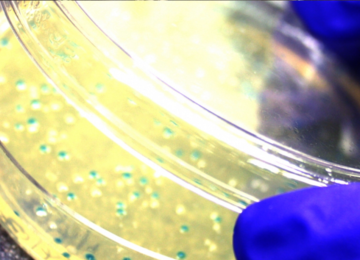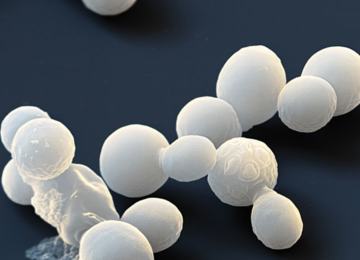

Protein Expression in Pichia pastoris
Pichia pastoris (recently re-classified as Komagataella pastoris), a methylotrophic yeast, is a very attractive expression host for recombinant proteins production. Pichia is one of the five protein expression systems offered by Bio-Technical Resources (BTR).
Recombinant protein expression technology continues to revolutionize all aspects of life and life sciences. Essentially, a gene encoding a protein of interest is expressed to produce the protein at a dramatically enhanced yield, and/or with greatly improved characteristics. Because of the native origin of the gene, particular applications of the protein and other considerations, it is critical to choose a suitable host for protein expression.
Typical Expression Vectors for Pichia pastoris
Various vectors, promoters, and secretion signal peptides are available for production of a protein in Pichia. We use microtiter plate platforms to screen large numbers of clones for the best expression variants.
Typical expression vectors for Pichia pastoris contain the following elements:
- Strong promoter: such as methanol inducible AOX1 promoter, or strong constitutive promoters (such as GAP1).
- Signal peptide to direct protein secretion: such as α-factor signal peptide.
- Homologous sequences for chromosomal integration at the AOX1 locus.
“We find it useful to test multiple promoters to correctly match expression levels of the protein of interest in Pichia. We apply that same strategy to optimize secretions, screening various signal peptides to elucidate the optimal pathway for secretion in this yeast,” says Dr. Shane Wesener, Director of Research and Development at Bio-Technical Resources.
Example of How Bio-Technical Resources Develops Strains and Processes for Protein Expression in Pichia pastoris
BTR will develop your Pichia pastoris expression strains and processes via a phased Development Program, to meet your present and future needs:
- Phase 1: Conduct a feasibility study using the selected host system – in this case, Pichia pastoris – to generate strains and evaluate expression in shake flask cultures.
- Phase 2: If Phase 1 is assessed to be successful in meeting a minimal required expression level, best strains will be evaluated in bench-top fermentors of 1- or 14-L scales. Typically, much higher protein production levels can be achieved in fermentors under better-controlled growth and expression conditions at high cell density, than can be achieved in shake flasks.
- Phase 3: Optimization: construct and evaluate advanced strains to improve protein expression; develop an efficient fermentation process suitable for your POI; scale-up and demonstrate the process at BTR 14-L and 60-L or 250-L pilot scales; and finally prepare a Technology Transfer Package to support transfer of the strain and process protocols to your commercial fermentation facility.
“There are two main secretory routes that can be utilized in Pichia pastoris. Determining which pathway is best suited for efficient production of the client’s unique protein provides key insights to guide further optimizations,” says Dr. Shane Wesener.
For even more detail, including a look at the additional protein expression host systems we offer, view our PowerPoint presentation.
Benefits of Pichia pastoris Expression Systems
Pichia pastoris is a powerful workhorse for the biotechnology industry, for several key reasons:
- Pichia pastoris produces proteins similar to those produced in mammalian systems because it has the ability to perform post-translational modifications typically associated with high eukaryotic proteins, including glycosylation, disulphide bond formation, and proteolytic processing.
- Unlike E. coli systems, Pichia pastoris is nonpathogenic, nontoxigenic, and produces no endotoxin.
- Pichia pastoris allows the option for either intracellular expression or secretion into the medium. Production of a protein secreted into the medium is highly desirable for simpler downstream processing.
- Several protein products made in Pichia pastoris have GRAS status from the FDA, meaning they’re approved for food and biopharmaceutical use.
Do You Offer Kits for Expression?
As a microbial technology service company, BTR does not offer kits for expression. Our focus is on providing services to rapidly develop strains and robust commercial processes in the most cost-effective way.
BTR’s technical staff includes microbiologists, molecular biologists, biochemists, fermentation scientists, and chemical and biochemical engineers. Their broad experience base, as well as our ability to assemble multidisciplinary project teams, has repeatedly proven to be an invaluable asset when approaching new R&D programs.
New Developments in Pichia pastoris
The biotech industry’s latest innovations using Pichia pastoris are in the biotherapeutic and food industries.
So far, Pichia pastoris has been used in the production of at least 500 types of biotherapeutics. For example, it’s used to produce a recombinant human insulin medication that treats diabetes.
Brewers and bakeries use Pichia pastoris expression to produce enzymes that aid in food processing – such as keeping bread soft, and lowering the alcohol concentration in beer.
